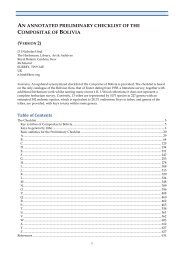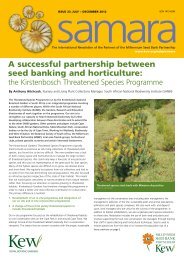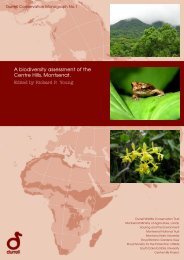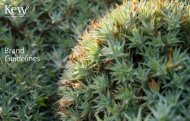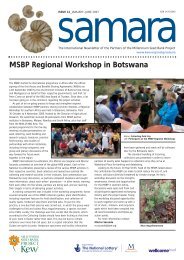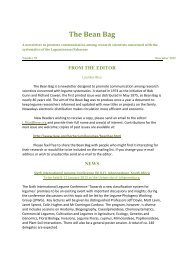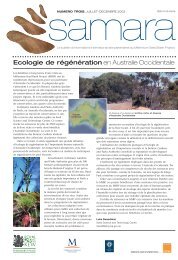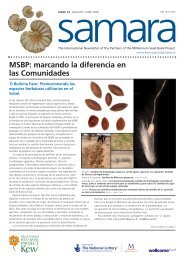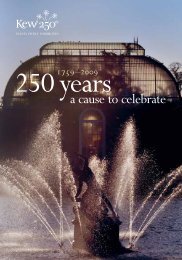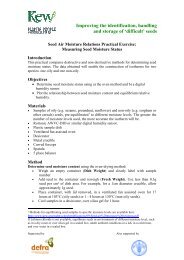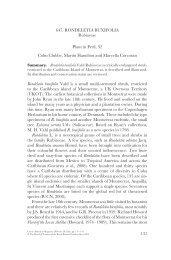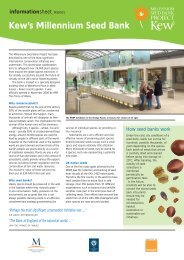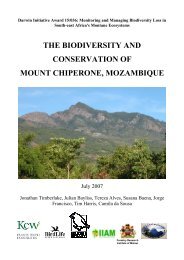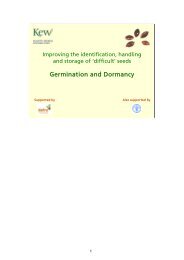Improving the identification, handling and storage of âdifficultâ seeds ...
Improving the identification, handling and storage of âdifficultâ seeds ...
Improving the identification, handling and storage of âdifficultâ seeds ...
You also want an ePaper? Increase the reach of your titles
YUMPU automatically turns print PDFs into web optimized ePapers that Google loves.
6.2. Summary <strong>of</strong> Burkina Faso stakeholder workshop<br />
Améliorer l’<strong>identification</strong>, la manutention et la préservation<br />
des graines à ‘conservation difficile’:<br />
10 th to 14 th July 2006 - Ouagadougou, Burkina Faso<br />
Dr. Kate Gold<br />
Royal Botanic Gardens, Kew<br />
The stakeholder workshop on conservation <strong>of</strong> difficult <strong>seeds</strong> was held from 10 th to 14 th July 2006, at<br />
Ouagadougou Burkina Faso. The workshop was opened by <strong>the</strong> Minister <strong>of</strong> Agriculture in <strong>the</strong><br />
presence <strong>of</strong> <strong>the</strong> Minister <strong>of</strong> Environment <strong>and</strong> <strong>the</strong> Representative <strong>of</strong> FAO in Burkina Faso. The<br />
workshop was attended by:<br />
▪ 21 participants from 13 African francophone countries (Benin, Burkina Faso, Cameroon,<br />
Centrafrique, Cote d`Ivoire, Gabon, Mauritius, Madagascar, Mali, Morocco, Niger, Rw<strong>and</strong>a,<br />
Togo)<br />
▪ Representative <strong>of</strong> GRENEWECA / IPGRI (Cotonou, Benin)<br />
▪ Representative <strong>of</strong> IPGRI (Rome, Italy)<br />
▪ Representative <strong>of</strong> FAO (AGPS, Rome, Italy)<br />
▪ NGO representatives from <strong>the</strong> Association <strong>of</strong> Support to Local Initiatives on Rural<br />
Development (AIDR) <strong>and</strong> <strong>the</strong> National Union <strong>of</strong> Seed Producers <strong>of</strong> Burkina<br />
▪ RBG Kew<br />
▪ 26 participants in total<br />
The programme followed a similar format to that <strong>of</strong> <strong>the</strong> South African workshop, <strong>and</strong> included<br />
country presentations, <strong>the</strong> external policy context (FAO), technical background (Kew), <strong>and</strong><br />
presentations from IPGRI, GRENEWECA <strong>and</strong> o<strong>the</strong>r stakeholders. The Association <strong>of</strong> Support to<br />
Local Initiatives on Rural Development (AIDR) <strong>and</strong> <strong>the</strong> National Union <strong>of</strong> Seed Producers <strong>of</strong><br />
Burkina talked about <strong>the</strong>ir roles, interests, organisation <strong>and</strong> <strong>the</strong>ir relationship with Research <strong>and</strong><br />
Agricultural departments. They were interested in <strong>the</strong> outcomes <strong>of</strong> <strong>the</strong> workshop <strong>and</strong> how <strong>the</strong>ir<br />
activities to improve seed production <strong>and</strong> conservation could be facilitated. Field visits to Centre<br />
National de Semences Forestières (CNSF) <strong>and</strong> <strong>the</strong> Laboratoire du Service National des Semences,<br />
allowed participants to see basic seed conservation <strong>and</strong> analysis equipment, <strong>and</strong> exchange with<br />
scientists on how <strong>the</strong>y h<strong>and</strong>le <strong>and</strong> assess seed quality.<br />
Presentations were followed by focus groups sessions <strong>and</strong> plenary discussions on ‘difficult species’,<br />
training <strong>and</strong> information needs, <strong>and</strong> priority equipment needs.<br />
Group sessions<br />
Participants worked in two groups, to discuss needs related to training, information, basic <strong>and</strong><br />
priority equipment, <strong>and</strong> to establish a preliminary list <strong>of</strong> species that are difficult to store for<br />
different institutes.<br />
Main recommendations:<br />
▪ Training <strong>of</strong> target groups <strong>of</strong> researchers, technicians <strong>and</strong> seed producers, in techniques <strong>and</strong><br />
methods <strong>of</strong> <strong>h<strong>and</strong>ling</strong> “difficult to store” <strong>seeds</strong> appropriately<br />
▪ Acquisition <strong>of</strong> basic technical equipment for streng<strong>the</strong>ning operational capacities <strong>of</strong> institutes<br />
which are in charge <strong>of</strong> seed conservation.<br />
▪ Compilation <strong>and</strong> access to scientific <strong>and</strong> technical information in relation to conservation <strong>and</strong><br />
<strong>h<strong>and</strong>ling</strong> <strong>of</strong> <strong>seeds</strong> that are difficult to store<br />
▪ Valorisation <strong>and</strong> dissemination <strong>of</strong> available technical information on <strong>seeds</strong> that are difficult to<br />
store, to institutes or countries, which are taking part in <strong>the</strong> project, <strong>and</strong> support <strong>of</strong> scientific<br />
writing in order to publish new or existing data from grey literature.



